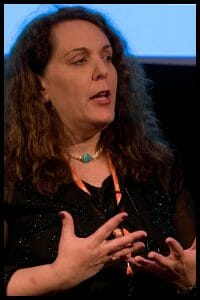A speaker and author, Holzschlag wrote about computer topics, especially the World Wide Web. She created the free Open Web Camp in 2009, and led it through 2013. So, what’s the Open Web? The Open Web “encompasses technical concepts like open-source code and open standards. It also encompasses democratic concepts like free expression and digital inclusion. But there’s a single underlying principle connecting all these ideas: An open web is a web by and for all its users, not select gatekeepers or governments.” That’s according to Mark Surman, Executive Director of the Mozilla Foundation. Holzschlag was a group lead for the Web Standards Project (WaSP), a coalition that campaigned browser makers to support modern web standards — including access for the disabled and the blind. The effort largely succeeded.

Holzschlag made sure web developers knew how to do that: she wrote or co-wrote 35 books on web design and open standards, including the classic, The Zen of CSS Design: Visual Enlightenment for the Web (2005). She also taught classes to aspiring webmasters at the University of Arizona, University of Georgia, University of Phoenix, New School University, and Pima Community College. “She was one of the first web gurus, a title she adamantly rejected — but it fit nevertheless,” says Eric Meyer, who pushed through much of the early work on Cascading Style Sheets — the language that determines how websites look and operate. “She was a groundbreaker, expanding and explaining the Web at its infancy.” And for her personality, he continued, “She was raucous, rambunctious, open-hearted, never ever close-mouthed, blazing with fire, and laughed (as she did everything) with her entire chest, constantly.” Holzschlag’s efforts brought her the title “Fairy Godmother of the Web”. But in 2014, she was diagnosed with aplastic anemia. Despite multiple rounds of chemotherapy, she died on September 5 at her home in Tucson, Ariz., at 60.
